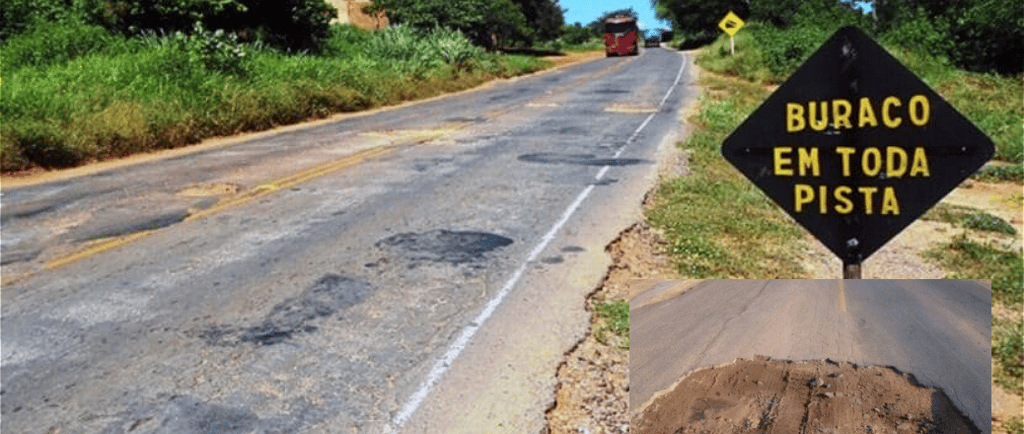The Curse of Taxes and Potholes on Brazilian Roads.
The Curse of Taxes and Potholes on Brazilian Roads. This dichotomy exposes a structural flaw in the system, where the "hunger for revenue" seems disconnected from the responsibility of delivering quality infrastructure, resulting in an extremely high cost for the average citizen.
NEWS
Unveiled Brazil
6/5/20253 min read


Government's Revenue Hunger Explodes Driving Costs for Families: The Curse of Taxes and Potholes on Brazilian Roads
In Brazil, vehicle ownership is a luxury that comes with a heavy annual tax burden. While federal, state, and municipal governments strive to increase revenue through a myriad of taxes and fees, Brazilian roads and streets remain in a lamentable state, riddled with potholes that constantly cause damage to motorists. This dichotomy exposes a structural flaw in the system, where the "hunger for revenue" seems disconnected from the responsibility of delivering quality infrastructure, resulting in an extremely high cost for the average citizen.
The Heavy Tax Burden on Vehicles in Brazil
Acquiring and maintaining a vehicle in Brazil is among the most expensive globally, largely due to the complex and high tax burden. Taxes on an automobile can represent between 30% and 48% of the final price of a national car, and exceed 60% for imported vehicles at the time of purchase. Furthermore, each year, the owner is confronted with a series of mandatory payments:
IPVA (Tax on the Ownership of Motor Vehicles): This is a state tax, collected annually, whose value ranges from 1% to 6% of the vehicle's market value, depending on the state and vehicle type. It is, undoubtedly, the most significant of these periodic taxes.
Annual Licensing (CRLV): A mandatory fee paid to the State Traffic Departments (DETRANs) for the vehicle to circulate legally. It serves as proof that the automobile is fit to travel, with debts paid and in compliance with safety and environmental regulations.
DPVAT (Personal Injury Insurance Caused by Terrestrial Motor Vehicles): Although DPVAT collection was suspended between 2021 and 2024, and a new reformulation (SPVAT) is being discussed, historically it was a mandatory annual insurance that indemnified victims of traffic accidents. Its eventual reactivation, even under a different name, will represent another cost.
Other Taxes at Purchase: When purchasing a vehicle, consumers already pay a series of taxes embedded in the price, such as IPI (Excise Tax on Industrialized Products), ICMS (Tax on Circulation of Goods and Services), PIS (Social Integration Program), and COFINS (Contribution for the Financing of Social Security).
This complex and high tax structure makes the cost of owning a car in Brazil exorbitantly high, eroding a significant portion of family income.
Potholes on Roads and Streets: The Silent Damage
In contrast to the vast revenue generated by vehicles, the quality of Brazilian road infrastructure is, in many cases, shameful. Potholed streets and poorly maintained roads are a daily reality for millions of motorists, turning the act of driving into a constant and costly challenge.
Potholes are not just an inconvenience; they are a constant source of financial loss and safety risks:
Damage to Vehicle Components: Frequent impacts with potholes cause premature wear or breakage in essential components such as tires (bulges, tears), wheels (dents, cracks), suspension (shock absorbers, springs, control arms), alignment, and balancing. These repairs are expensive and frequent, representing an additional, unplanned burden on the family budget.
Increased Fuel Consumption: Poor pavement quality and the constant need to swerve to avoid potholes or sharply reduce speed increase fuel consumption, raising motorists' daily expenses.
Increased Risk of Accidents: Unexpected potholes can lead to loss of vehicle control, rollovers, collisions, and other serious accidents, resulting in injuries, fatalities, and further material damage.
Vehicle Depreciation: Constant use on precarious roads contributes to accelerated vehicle depreciation, impacting its resale value.
"Sugar Engineering" and the Lack of Adaptation to Brazilian Reality
The term "sugar engineering" is often used, pejoratively, to describe infrastructure projects and executions that are poorly planned, of low quality, or that do not withstand Brazil's climatic and usage conditions. Many critics argue that paving projects are sometimes imported or based on models that do not consider the peculiarities of the tropical climate, with intense rains and temperature variations that accelerate asphalt degradation.
The lack of preventive and continuous maintenance is another crucial factor. Instead of investing in more durable projects and regular maintenance, resources seem to be directed towards palliative repairs (the famous "patchwork" solution), which temporarily solve the problem but do not address its root cause. This perpetuates a vicious cycle of deterioration and spending.
The Taxpayer's Dilemma: Paying High, Receiving Little
Brazilian citizens find themselves in a paradox: they pay extremely high taxes on their vehicles and traffic operations, with the expectation that these resources will translate into quality roads and streets. However, the reality is one of deficient infrastructure, which not only fails to deliver on promises but also generates additional costs for unexpected maintenance and repairs.
This situation fosters a feeling of injustice and a lack of return on public money. The government's "hunger for revenue," without the counterpart of adequate services and infrastructure, directly translates into higher costs for families, who bear the burden of an aggressive tax policy and inefficient resource management.
The discussion about traffic taxes in Brazil goes beyond mere numbers. It reflects the quality of public management and its direct impact on people's lives. For the scenario to change, it is fundamental to have more transparency in the allocation of resources, more robust infrastructure planning adapted to local reality, and a real commitment to road maintenance. Only then can the burden of owning a vehicle in Brazil, perhaps, become less heavy and more just for the millions of motorists who daily face the "curse" of potholes.
